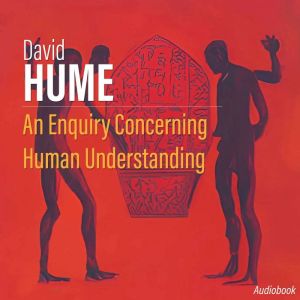

An Enquiry Concerning Human Understanding
Author: David Hume
Narrator: Liam Johnson
Unabridged: 4 hr 40 min
Format: Digital Audiobook Download
Publisher: Stream Readers
Published: 03/02/2023
Categories: Nonfiction, Philosophy, Epistemology


Author: David Hume
Narrator: Liam Johnson
Unabridged: 4 hr 40 min
Format: Digital Audiobook Download
Publisher: Stream Readers
Published: 03/02/2023
Categories: Nonfiction, Philosophy, Epistemology
David Hume (1711-1776) was a Scottish philosopher, historian, economist, and essayist whose best known works include A Treatise of Human Nature, An Enquiry Concerning Human Understanding, An Enquiry Concerning the Principle of Morals, The History of England, and The Natural History of Religion. Born in Edinburgh, he attended Edinburgh University and lived for several years in La Flèche, France. Hume's work is centrally concerned with the psychological characterics of human nature and the foundations of human understanding and is characterized by a pervasive skepticism regarding received wisdom, religion, and other institutions. A towering figure in empiricist philsophy, Hume influenced writers including Adam Smith, Immanuel Kant, William James, and Jeremy Bentham, and his work is often considered a precursor to contemporary cognitive science.
A "skeptic" in the true sense of the word, dedicated to the task of demolishing the arrogant pretensions of the many rationalist systems of his time. Here, Hume points out various holes in various central concepts of the developing modern philosophy - the notion of cause and effect, of liberty and n......more
David Hume is an eighteenth-century English philosopher who had a more skeptical outlook. In this short work from later in his life, he writes about various issues around what humans know and how we know those things. He starts out with a distinction between moral philosophy and natural philosophy.......more
I don't typically give up on books, especially philosophic texts. But Hume is quite onerous to read (or, at least, this particular set of works is onerous to read). Certainly, Hume has contributed much to philosophic thought, and everyone should be familiar with his ideas. But, as with many Enlighte......more
Of the philosophers I have had to read so far for my 896 exam, Hume is my favorite. He does what the best analytic philosophers do, which is to draw very radical conclusions in a very orthodox way. After reading this book, I am interested in learning more in particular about Hume's implications for......more
I think this is the book I realized that I’m probably more interested in social science rather than pure philosophy (especially ontology). It simply can’t convince me when the author has some mistakes/some non-conforming examples in his logic, and he’s still trying to over generalize things in this......more